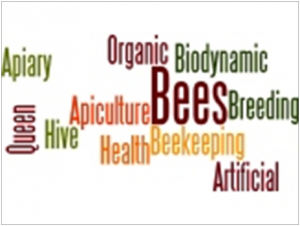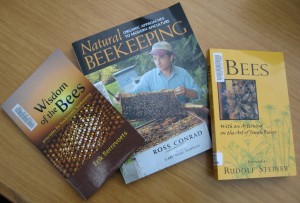 Rudolf Steiner (1861-1925) was a highly trained scientist and respected philosopher credited with founding the field of biodynamics, seeking social change in the practice of farming. In a series of lectures in 1923 in Dornach, Switzerland he accurately predicted that interfering with the natural, organic functions of hives would lead to the dire state of the honeybee that exists today. Steiner’s 1923 lectures have been translated into English and compiled in Bees (299.935 St34uB) and includes an afterword on the art of Joseph Beuys, which was influenced by these lectures.
Rudolf Steiner (1861-1925) was a highly trained scientist and respected philosopher credited with founding the field of biodynamics, seeking social change in the practice of farming. In a series of lectures in 1923 in Dornach, Switzerland he accurately predicted that interfering with the natural, organic functions of hives would lead to the dire state of the honeybee that exists today. Steiner’s 1923 lectures have been translated into English and compiled in Bees (299.935 St34uB) and includes an afterword on the art of Joseph Beuys, which was influenced by these lectures.
In Wisdom of the Bees: Principles for Biodynamic Beekeeping (638.1 B277W) Erik Berrevoets explores Rudolf Steiner’s ideas and research on the nature of bees and their implications on beekeeping. Berrevoets, a veteran beekeeper offers practical advice for modern beekeepers on holistic beekeeping practices.
 Destructive pests such as the Varroa mite have led to the standard practice of chemically treating beehives. As these pests are becoming increasingly resistant to such measure, beekeeper Ross Conrad offers holistic, non-toxic organic alternatives for beekeepers. Natural Beekeeping: Organic Approaches to Modern Apiculture (638.1 C657N)covers such topics as hive management, genetics and breeding, hive diseases, pests, environmental and human threats, and honey harvest.
Destructive pests such as the Varroa mite have led to the standard practice of chemically treating beehives. As these pests are becoming increasingly resistant to such measure, beekeeper Ross Conrad offers holistic, non-toxic organic alternatives for beekeepers. Natural Beekeeping: Organic Approaches to Modern Apiculture (638.1 C657N)covers such topics as hive management, genetics and breeding, hive diseases, pests, environmental and human threats, and honey harvest.

